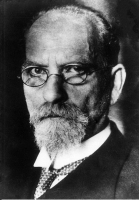| Edmund Gustav Albrecht Husserl | |
| 埃德蒙德·古斯塔夫·阿尔布雷希特·胡塞尔 | |
| | |
生平
胡塞尔生于捷克摩拉维亚地区的小镇普罗斯涅兹,出身于一个犹太人家庭。
作为弗朗兹·布伦塔诺及卡尔·斯图姆夫的学生,他影响了艾蒂特·史坦茵(圣十字德兰本笃修女)、奥伊根·芬克、马丁·海德格尔、让·保罗·萨特及莫里斯·梅洛-庞蒂。因为赫尔曼·外尔曾接触胡塞尔,所以钟情于学院派逻辑。自1886年,他在哈勒大学以导师身份(相当于副教授)教授哲学,并于1887年,他开始相信基督教并且加入了路德会,同年结婚,并在此育有两儿一女。1901年至1916年,他分别在哥廷根大学及弗莱堡大学担任教授,直到1928年退休为止。退休后胡塞尔仍然利用弗莱堡大学图书馆来继续他的研究及著作,直到他的得意门徒海德格尔担任校长时,以胡塞尔的犹太人血统为理由禁止胡塞尔进入为止。
学术贡献
胡塞尔认为——与罗素及怀德海一样——算术实际上是“先验”科学。不同的是,罗素与怀德海的分析基础是逻辑学。胡塞尔则是发展出全新的哲学方法,来探究必然真理的性质。他称之为“现象学”( phenomenology )。
胡塞尔将现象学定义为对意识本质结构的科学研究,但现象学并不代表表象与根本实在之间存在着对立 (“现象学”源自于希腊文,意指“表象”。康德曾用“现象”一词指称我们的经验世界)。胡塞尔承诺,借由描述意识结构,可以找到确定性,其中包括他身为数学家时不断寻求的算术基础。为此,胡塞尔描述了现象学的观点:意识被视为一种“意向”,也就是说,意识总是朝向某个客体,不管它是物质的,还是跟数学一样是“观念的”。要获得现象学的观点,必须透过一连串的现象“还原”,亦即描述意识的本质特征 (即意识的“意义”)。胡塞尔认为这些意义(与康德的范畴相同)是普世与必然的,同时也反对欧洲(与美国)哲学弥漫一股“相对主义”风潮。
胡塞尔晚年时,纳粹已逐渐掌握德国政局,世界也战云密布。因此,胡塞尔对人类知识的兴趣,也转而朝向社会层面与“存在”层面。同时也警告,欧洲文明将因相对主义与非理性主义的猖獗而陷入“危机”(同一时间,维也纳的逻辑实证论者也提出相同的警告)。
外部链接
胡塞尔著作
- Husserl-Archives Leuven The main Husserl-Archive in Leuven,现象学研究国际中心
- Husserliana: Edmund Husserl Gesammelte Werke 胡塞尔著作全集(仍在编撰中)
- Husserliana:Materialien 教材
- Husserliana:Documente 文件
- Edmund Husserl Collected Works 胡塞尔著作的英语版本
- Husserl-Archives Cologne at the University of Cologne
- Husserl-Archives Freiburg
- Husserl Archives at the New School (纽约)
- Archives Husserl de Paris at the École normale supérieure, Paris.
- Cartesian Meditations (笛卡儿的沈思) 在 Internet Archive
- Ideas, Part I 在 Internet Archive
胡塞尔研究
- 倪梁康:〈思考“自我”的两种方式——对胡塞尔1920年前后所撰三篇文字的重新解读〉(2010)
- 倪梁康:〈胡塞尔哲学中的“原意识”与“后反思”〉(1998)
- 倪梁康:〈胡塞尔与海德格尔的存在问题〉 页面存档备份,存于互联网档案馆(1999)
- 倪梁康:〈《逻辑研究》中的观念对象和观念直观〉(2009)
- 倪梁康:〈关于胡塞尔的《内时间意识现象学》〉(2009)
- 倪梁康:〈胡塞尔的意向性概念与休谟的信仰概念〉(2003)
- 倪梁康:〈深邃与明晰——海德格尔-胡塞尔关系漫谈〉 页面存档备份,存于互联网档案馆(1997)
相关网站
- www.husserlpage.com "Aim: To provide easy access to those net resources pertaining to the life and work of the 20th century philosopher, Edmund Husserl."
- Husserl.net 胡塞尔著作开放内容计划
- Husserl.info 文章、现象学目录及参考书目数据库、指南、Wesenschau 页面存档备份,存于互联网档案馆 电子期刊及现象学的目录及论坛
- Ontology. A resource guide for philosophers Edmund Husserl's Formal Ontology.
- Stanford Encyclopedia of Philosophy entry
- The Husserl Circle
- 韦汉杰 : 胡塞尔(下)(香港人文哲学会)[永久失效链接]
- 埃德蒙德•胡塞尔 on Sogou
研究书目
- 倪梁康:《现象学及其效应》(北京:三联书店,1994)。
- 张庆熊:《熊十力的新唯识论与胡塞尔的现象学》(上海:上海人民出版社,1995)。
Edmund Gustav Albrecht Husserl (/ˈhʊsɜːrl/ HUUSS-url, also US: /ˈhuːsɜːrl, ˈhʊsərəl/ HOO-surl, HUUSS-ər-əl; German: [ˈʔɛtmʊnt ˈhʊsɐl]; 8 April 1859 – 27 April 1938) was a German philosopher who established the school of phenomenology. In his early work, he elaborated critiques of historicism and of psychologism in logic based on analyses of intentionality. In his mature work, he sought to develop a systematic foundational science based on the so-called phenomenological reduction. Arguing that transcendental consciousness sets the limits of all possible knowledge, Husserl redefined phenomenology as a transcendental-idealist philosophy. Husserl's thought profoundly influenced 20th-century philosophy, and he remains a notable figure in contemporary philosophy and beyond.
Husserl studied mathematics, taught by Karl Weierstrass and Leo Königsberger, and philosophy taught by Franz Brentano and Carl Stumpf. He taught philosophy as a Privatdozent at Halle from 1887, then as professor, first at Göttingen from 1901, then at Freiburg from 1916 until he retired in 1928, after which he remained highly productive. In 1933, due to racial laws, having been born to a Jewish family, he was expelled from the library of the University of Freiburg, and months later resigned from the Deutsche Akademie. Following an illness, he died in Freiburg in 1938.

